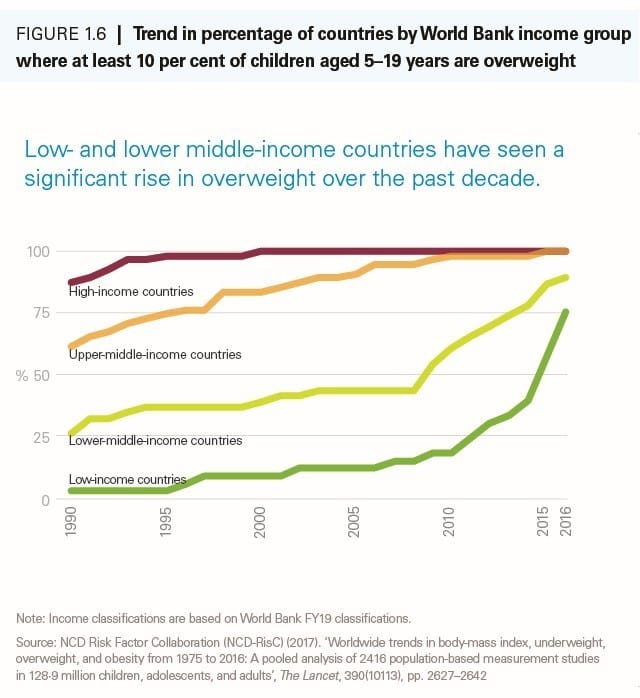- Families would benefit from healthier food environments.
- Economic impact of obesity estimated at US$2 trillion.
- ‘Obesogenic’ describes settings that promote unhealthy eating.
If we want to turn the tide on the global crisis of childhood obesity, we’ll need to use “whole of society” approaches to build healthier food environments.
The global increase in obesity among children can feel like an unstoppable trend – the inevitable consequence of a shift away from traditional diets and lifestyles; of growing access to cheap, calorie dense, nutrient-poor, hyper-palatable foods. But, while addressing the issue represents a major and complex challenge, a growing body of evidence and experience is pointing to solutions that could work. And governments, business and civil society are starting to pay attention.
The challenge
Rates of obesity in childhood and adolescence are increasing in almost every country, across every continent. Once considered a condition of the rich, it now affects children in countries of all income levels, and three quarters of all children with obesity are living in middle-income countries. Compared to 1975, ten times more girls and 12 times more boys are affected by obesity today – and there is little evidence of any country achieving and sustaining a decline in obesity across the population.
The impact of obesity
The problem has serious consequences for the individuals and families they impact, and for entire societies and nations. Obesity in childhood can lead to stigmatization and depression, and is a strong predictor of adult obesity, which can lead to serious health consequences. Poor diets are now the main risk factor for the global burden of disease.
Obesity also results in major financial and social burdens, impacting millions of people and stretching healthcare systems and budgets. The economic impact is estimated to be US$2 trillion, or 2.8 per cent of the world’s GDP – roughly equivalent to the economic costs of smoking or armed conflict.

Root causes
It is clear that the growth in obesity is not simply about children or families making ‘bad choices’. Around the world, the spread of ‘obesogenic’ environments – settings that promote unhealthy eating and discourage physical activity – is a key factor. Within these environments, unhealthy foods are cheap and readily available, while healthier foods are harder to find and are often expensive.
Urbanization and globalization have played a major part in shaping food options and choices. More food now crosses borders, and production is concentrated in the hands of a relatively small number of businesses. Indeed, 77 per cent of processed food sales worldwide are controlled by just 100 large firms, many of which market these products to children using emotion-based marketing strategies across multiple media, including in settings where children should be especially protected, such as schools. The result has been a substantial increase in consumption of these foods: 42 per cent of school-going adolescents drink carbonated soft drinks at least once a day and 46 per cent eat fast food at least once a week.
Also read: Holiday eating? Some foods are designed to make you overeat even when full
Action that works
To make our societies work better for children, we need to respond to the challenges children, young people, women and families face in their daily lives.
The needs of children must be put at the heart of our food systems. Financial incentives should be used to reward actors who increase the availability of healthy and affordable foods in markets and other points of sale especially in low-income communities. Actions such as mandatory front-of-pack labelling and protection against exploitative marketing practices, which have been proven effective in creating healthier food environments, should be implemented and taken to scale.
At the same time, we need to also integrate obesity prevention as a priority across other systems, including health, education and social protection, and ensure that our cities are child friendly and health promoting.
Whole of society approaches
To push back on the rise of childhood obesity, we need approaches that bring together all sectors of society to build healthier food environments.
While governments must be at the forefront in setting policies, strategies and programmes, they cannot do it alone. Business and civil society groups, as well as families, children and young people themselves, all have important roles to play and action to take.
These principles are being put into practice, often with exciting results. In cities including Amsterdam and London mayors have shown leadership and ambition through city-wide, cross-cutting actions in food procurement, transportation and planning, education, social services and health facilities. In Chile, Malaysia and Mexico, governments are putting in place tried and tested legislation to disincentivize consumption of sugary products through taxation and better food labelling. And an increasing number of global donors and partners – Bloomberg Philanthropies, the Dutch and Norwegian government, Beko and Novo Nordisk to name a few – are stepping into this space, framing unhealthy diets and obesity as a sustainable development issue.
The way forward
Let us remember what this is about. We must provide parents and children with the support they need and deserve to access nutritious foods, be active and grow healthily. Children and young people are counting on us.
To do this, UNICEF and its partners must work even harder to expand our understanding of what works to prevent obesity, and we must be forceful in advocating for systemic change and redouble our collective efforts to scale up solutions that work.
Charlotte Petri Gornitzka is the Deputy Executive Director, United Nations Children’s Fund (UNICEF).
Also read: More than 80% adolescents worldwide aren’t getting enough exercise: WHO






